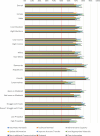Most Americans support minimizing administrative burdens for Medicaid recipients as the public health emergency ends
- PMID: 38756841
- PMCID: PMC10985919
- DOI: 10.1093/haschl/qxad001
Most Americans support minimizing administrative burdens for Medicaid recipients as the public health emergency ends
Abstract
During the coronavirus disease 2019 (COVID-19) public health emergency (PHE), states were barred from disenrolling anyone from Medicaid unless the beneficiary asked to be disenrolled, moved out of state, or died. Coverage increased, but as the PHE ends an estimated 7 million eligible Americans are expected to lose insurance due to difficulty navigating the renewal process. The end of the PHE therefore offers state policymakers a chance to reassess the value of such administrative burdens as a variety of policy tools are available to mitigate these losses. We inform this discussion via a national survey that captures public preferences around administrative burdens in public health insurance. We find strong public support for burden-reduction techniques that minimize coverage losses such as using administrative data to shift burdens onto the state and better outreach and communication, with an average of 74% of respondents supporting each policy tool. This support holds across the ideological spectrum and demographic groups, but it is stronger among liberals than conservatives, for those with more direct experience of burdens, those who struggle with such burdens, and for those with lower racial prejudice.
Keywords: COVID-19; Medicaid; access to care; public health emergency.
© The Author(s) 2023. Published by Oxford University Press on behalf of Project HOPE - The People-To-People Health Foundation, Inc.
Conflict of interest statement
Please see ICMJE form(s) for author conflicts of interest. These have been provided as supplementary materials.
Figures





Similar articles
-
Race And Racial Perceptions Shape Burden Tolerance For Medicaid And The Supplemental Nutrition Assistance Program.Health Aff (Millwood). 2023 Oct;42(10):1334-1343. doi: 10.1377/hlthaff.2023.00472. Health Aff (Millwood). 2023. PMID: 37782861
-
Continuous Medicaid coverage during the COVID-19 public health emergency reduced churning, but did not eliminate it.Health Aff Sch. 2023 Nov;1(5):qxad055. doi: 10.1093/haschl/qxad055. Epub 2023 Oct 21. Health Aff Sch. 2023. PMID: 38223316 Free PMC article.
-
Duration and Continuity of Medicaid Enrollment Before the COVID-19 Pandemic.JAMA Health Forum. 2022 Dec 2;3(12):e224732. doi: 10.1001/jamahealthforum.2022.4732. JAMA Health Forum. 2022. PMID: 36525256 Free PMC article.
-
Medicaid policy data for evaluating eligibility and programmatic changes.BMC Res Notes. 2023 Oct 3;16(1):250. doi: 10.1186/s13104-023-06525-6. BMC Res Notes. 2023. PMID: 37789360 Free PMC article. Review.
-
Evaluating Medicaid expansion benefits for patients with cancer: National Cancer Database analysis and systematic review.J Cancer Policy. 2021 Sep;29:100292. doi: 10.1016/j.jcpo.2021.100292. Epub 2021 Jun 5. J Cancer Policy. 2021. PMID: 35559947 Free PMC article.
Cited by
-
Assessing past and future COVID-19 vaccine hesitancy in the United States in light of federal policy changes.Health Aff Sch. 2023 Dec 1;1(6):qxad073. doi: 10.1093/haschl/qxad073. eCollection 2023 Dec. Health Aff Sch. 2023. PMID: 38756358 Free PMC article.
-
"Where There's a Will There's a Way": The Impact of State Variations in the Implementation of Continuous Coverage on Access to Postpartum Care During the Pandemic Emergency.Health Serv Res. 2025 Apr;60 Suppl 2(Suppl 2):e14435. doi: 10.1111/1475-6773.14435. Epub 2025 Jan 20. Health Serv Res. 2025. PMID: 39834080
-
Patients' experiences with 'sludge' (administrative burden) in the cancer screening process and its relationship with screening completion, experience and health system distrust.Fam Med Community Health. 2024 Sep 18;12(Suppl 2):e002933. doi: 10.1136/fmch-2024-002933. Fam Med Community Health. 2024. PMID: 39299768 Free PMC article.
-
Putting Health care Where the Kids Are: US Public Attitudes About School-Based Health Centers.J Sch Health. 2025 Jan;95(1):56-69. doi: 10.1111/josh.13478. Epub 2024 Jun 10. J Sch Health. 2025. PMID: 38857903 Free PMC article.
References
-
- Halling A, Bækgaard M. Administrative burden in citizen-state interactions: a systematic literature review. OSF Preprints; 2022. https://osf.io/26xdj
-
- Doughty M, Baehler KJ. “Hostages to compliance”: towards a reasonableness test for administrative burdens. Perspecti Public Manage Govern. 2020;3(4):273–287.
-
- Herd P, Moynihan DP. Administrative Burden: Policymaking by Other Means. Russell Sage Foundation; 2018.
-
- Brown JT, Carey G, Malbon E. What is in a form? Examining the complexity of application forms and administrative burden. Aust J Public Adm. 2021;80(4):933–964.
-
- Chudnovsky M, Peeters R. A cascade of exclusion: administrative burdens and access to citizenship in the case of Argentina's national identity document. Int Rev Adm Sci. 2022;88(4):1068–1085.
LinkOut - more resources
Full Text Sources
